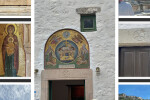Palmerage: Pilgrimage to Greece | Day 7


Ephesus & Patmos: Gathering and Exile
“But when they recognized that he was a Jew, for about two hours all of them shouted in unison, ‘Great is Artemis of the Ephesians!’ But when the town clerk had quietened the crowd, he said, ‘Citizens of Ephesus, who is there that does not know that the city of the Ephesians is the temple-keeper of the great Artemis and of the statue that fell from heaven? Since these things cannot be denied, you ought to be quiet and do nothing rash. You have brought these men here who are neither temple-robbers nor blasphemers of our goddess.”
—Acts 19
We woke up in the beautiful port city of Kușadasi, on the west coast of Türkiye. From there we headed to the House of Mary, a cave like structure purported to be the last home of Mary after she traveled to Ephesus with John, the youngest of the apostles.
While at the House of Mary, I led morning prayer using Morning Prayer from the Iona Community for our group to mark our time there and prepare us for our next stop in Ephesus.
Ephesus! Originally a port city, the bustling and cosmopolitan city of Ephesus served as the home to the Temple of Artemis, their matronal deity, and the great library of Ephesus, the temple honoring Hadrian, and, after early Christian communities began to form in Asia Minor, the temple Diocletian built to declare himself as lord above all. It was also a major stop along the Silk Road.
Paul and Silas landed in Ephesus making a big first impression—many people we moved by their message of Jesus Christ in the world, and we baptized. Some however, feared this new lord would diminish devotion to other deities, namely that of Artemis whose wares and talismans they sold in the agora.
Acts testifies to Paul’s time in Ephesus, where he establishes a community of believers, a church. His letter to the Ephesians helps us understand the concerns of that church in such a large city. Boasting an amphitheater that could seat 25,000, and often serving as the first and last port of call for those traveling the Mediterranean, Ephesus was no small operation and the founding of an early Christian community there proved a critical and significant undertaking for Paul. This community was located at what felt to many as the center of the world. A prime spot in which to make disciples and send them out to do the work God has given them to do.
Earthquakes upon earthquakes caused silting of the land and at some point and the sea receded five miles from Ephesus rendering it useless as a port. The once great and powerful city Ephesus fell into disrepair and, once the capital of Greece was designated at Constantinople, it fell into ruins until finally grass and rock covered this once majestic site and it faded from collective memory much like the frescos on the walls of its buildings have faded over millennia.
Before heading back to the dock we stopped at a Turkish rug heirloom school. Turkish rug making is an ancient art, passed down from generation to generation, but now there are schools for young people to learn the craft. We watched as a rug maker spin silk from silk worms and another rug maker worked on her loom. Then we had a private rug viewing in which we were able to touch and walk on different Turkish rugs and learned how to tell them apart from knockoffs. My favorites were the silk rugs—so soft! The best part of the tour was the complimentary apple tea provided—delicious.
Today was a long day on land and sea. We reboarded our ship and set sail for Patmos, arriving around 3 hours later. Today’s disembarkation was by tender boat, we skipped over choppy water right to the dock.
Pulling into Patmos was eerie, it feels like you’ve fallen off the edge of the Earth (thank goodness we know the earth is round!). Patmos is a lonely place and it is easy to imagine what John must have felt when his captors rowed him to shore—desolation and despair.
Patmos is not like that now. Again I thought about the ways solitude and exilation were perhaps easier to accomplish in the ancient world. In Patmos, only one or two cruise ships can tender at a time because the presence of their passengers completely overwhelms the main town of Skala, not to mention St. John’s cave and the monastery. Today only our boat arrived at 4pm and the sites were still overrun—we moved incrementally around the main island with multiple tour groups running into one another and waiting somewhat patiently for the group ahead of them to finish at each icon, painting, point of interest.
I was hopeful that Ephesus or Patmos would provide an opportunity to procure olive oil for the bishop to bless for our Chrism, but alas, no such luck. I did find some wonderful smelling incense in Patmos that I am very excited for us to use in the coming weeks at the 11:15am liturgy.
It was on Patmos that John had his apocalyptic vision, a voice telling him to write an important message to the seven churches in Asia Minor. Ephesus was on such church. John was in Ephesus, he knew the greatness and vastness of the city. And suddenly he knew the depth of exile. When we read Revelation we witness this: John writes of gathering and exile in this text, unveiling for us the ultimate desire of God, that those who have known the weight of exile would be regathered in God, God
making God’s home among them and them making their home in God.
tomorrow: Rhodes, a medieval city where Christianity meets Islam.
faithfully, ryan

Comments
Login/Register to leave a comment